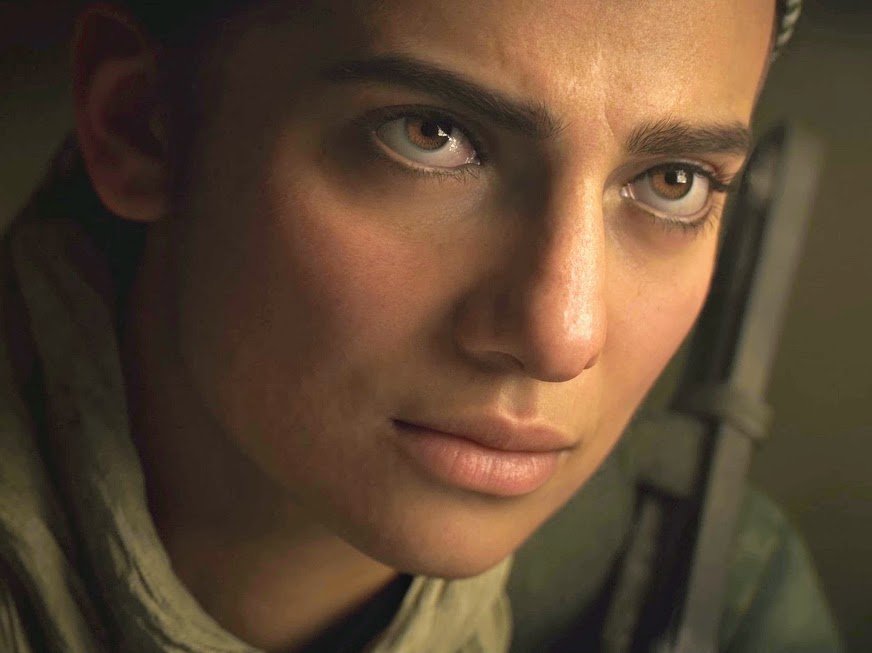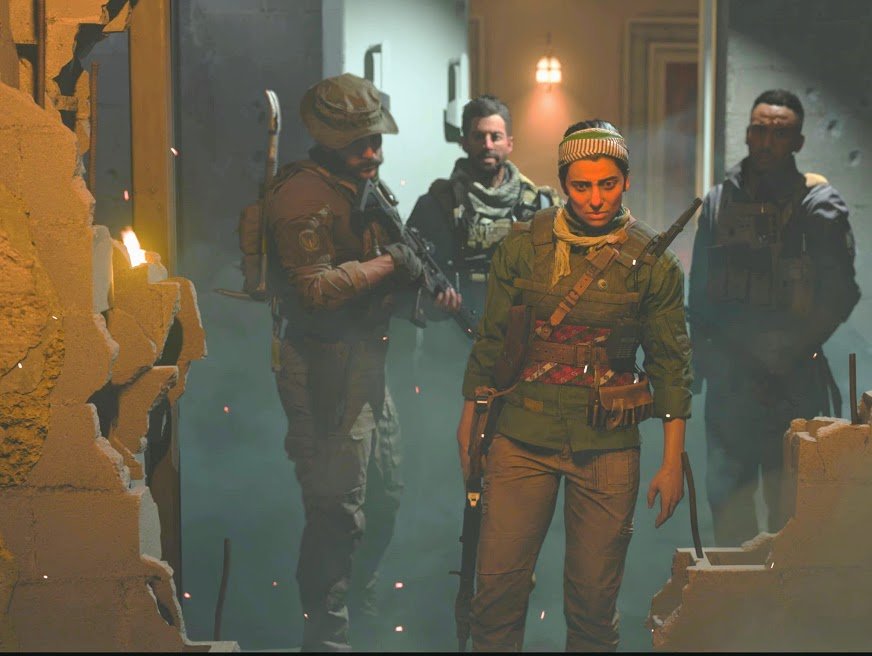We need to talk about what happens to Farah in Call of Duty: Modern Warfare (Spoilers)
While a good story overall, this backstory left me feeling a little gross.

All the latest news, reviews, and guides for Windows and Xbox diehards.
You are now subscribed
Your newsletter sign-up was successful
Last week, Activision invited me to a review event for Call of Duty: Modern Warfare. While my colleague has an amazing review of the full experience you can read now, I found myself deeply conflicted with the overall story told in the campaign mode. Every Modern Warfare story has an edge to it, and with good reason, but this new game goes a little darker in ways that nearly made me leave my review station and stop playing the game entirely.
It makes recommending the game to specific groups of friends really difficult.
Editor's Note: This article contains SPOILERS. A lot of them. If you care about the plot of this game and have not beaten it, stop reading now.
At their core, Modern Warfare games have always taken time to expose people to the darker side of military combat in the modern era. While the core game is about getting the coolest gear and scoring the most kills in glorious multiplayer, the stories tend to expose you to experiences inspired by actual people who were faced with impossibly dark situations.
This new game continues the tradition, only this time through the eyes of a woman named Farah Karim. While there are three other guys you also play as during the campaign, Farah is the only one who gets a proper backstory. As you can imagine, the only woman on the team did not have a particularly nice childhood.
You learn about Farah's struggles through doing, not just by watching cutscenes. The first of these experiences happens through the eyes of a young girl, maybe seven or eight years old. As young Farah, you crawl around in your childhood home to escape the man who just murdered your father in front of you until you find a tool to attack him back with. It could be a knife, a screwdriver — really anything that is handy. After you stab the guy once he knocks you around a little and you repeat this alarming minigame again. Eventually, he dies at the hands of this child you've been made to play as and the scene ends.

Later in the game, Farah has another flashback. This time, entirely-too-young Farah picks up a pistol and murders another man while her brother sneaks around behind them. Again, this isn't a cut-scene; you are playing a child fighting for her life. It's brutal, it's intense, and it's, frankly, kind of jarring.
All the latest news, reviews, and guides for Windows and Xbox diehards.
The next flashback is by far the most disturbing. Farah is much older now, and the person she has been fighting against has her captive and is trying to get information from her by waterboarding her. You hear Farah choking, and you see the water splashing over her face, and there are instructions on the screen telling you to use buttons to move her head and try to breathe. If you can get Farah's head away from the water at just the right time, she can gasp for breath and continue fighting. It's rough, and making it interactive was a lot to take in.
The more I thought about this combined experience, the worst I felt about it. Why were these experiences interactive? And why was Farah the only person on the team with such a rough backstory? What did this add to the overall story the game was telling? I sat down with Infinity Ward Studio Narrative Director Taylor Kurosaki and Gameplay Director Zeid Reike to get some answers.
Russell Holly: How did you decide which character needed the most backstory?
Infinity Ward Studio Narrative Director Taylor Kurosaki: We want to build empathy, at its most basic we want players to want to succeed in the game — to complete their missions, to want to keep the person they are playing safe. One of the best levers we have for this is to make you want to care for these characters. So you have to spend time with them, but in terms of the amount of real estate we give one over the other, it depends. The vast majority of our players don't know somebody who has a background like Farah. She's more dissimilar than some of the other characters our player base will interact with. Spending more time on her background is more important. By going back into her story we can see why she feels so strongly when it comes to some of the views she has.
Characters like Kyle or Alex are more similar to the backgrounds of some of our players, so less time was spent on their backstories. But there still needed to be some time spent, so you can see where their motivations come from.
Russell: What made you feel it was necessary to put the player in some of these darker story parts instead of making it a cut-scene?
Infinity Ward Gameplay Director Zeid Reike: Any time you have the opportunity to take something emotionally impactful and let the player do it themselves, as opposed to watch characters do it, it's going to be even more impactful. It's what sets us apart from film. In a game I can empathize with someone as I'm literally walking in their shoes. These were situations that we wanted to put the player in, not just put Farah in, and have them experience it for themselves. That's why we make first-person games, to be able to say "I am in this situation" and not "I am watching this situation."
Russell: What was the narrative benefit to going as dark as these scenes go?
Taylor: Again, it's to build empathy. I don't live in a war-torn city where my town and my family have experienced these horrors, but many people do. We don't hear about these often, the Western perspective on war is "I'm going to enlist, I'm going to deploy, I'm going to receive orders, I'm going to complete my mission." That is the Western perspective on war, and we were inspired by the way the original Modern Warfare switched perspectives.
But even those perspectives, one was an SAS British guy and one was an American Marine. We're making Modern Warfare in 2019, what perspectives are missing? The perspective of someone who doesn't choose to go to war, war comes to them. I've never lived like that, and have reason to believe most of our players have never been in a situation like that, to understand what motivates this character you have to show this totally different experience._
The goal wasn't to create shock value or to be provocative, it's to build empathy with that character.
Russell: And this applies to when she's waterboarded as well, when you force the player attempt to avoid their fate? How did you come to the conclusion that this was necessary?
Taylor: We work with a lot of consultants: military consultants, former Tier 1 Operators like former Navy Seals, people who work in the CIA, war correspondents, and cultural consultants. We're looking to depict these situations authentically, and to build that understanding. We're making an interactive experience, and to put you in those shoes is — you mentioned that we're forcing the player to do this, we're actually not. You have the choice as the player in that moment to just submit, and to not try to get air, and the game progresses. There's not a fail state there where you have to try again, the game allows you to sit still. You can make that choice based on what you think you would do. Would you fight to get a breath of air, or would you be so overwhelmed that you retreat within yourself? I don't know, but I know what Farah would do, because we've seen her fully formed in the beginning of the game. She's clearly someone who would fight, these characters clearly state who they are and what they stand for.
I think that, by that point in the story, the players know she's not going to take this lying down. She's going to resist, and so I think most people also resist. In doing this, I think we've built parity between the players and their emotional estate and the character they're playing as.
Are the triggers worth it?

Overall, I'm not sure I agree this was the right path to take with Modern Warfare. It's not at all obvious you don't have to participate in the waterboarding, and I happened to be sitting in the room playing with someone who had actually been waterboarded before and it made them way more uncomfortable. How is this part of the game going to impact soldiers, a demographic which makes up a nontrivial part of the Call of Duty audience? PTSD triggers are a very real thing, and this experience offers no warning nor way to skip or leave the narrative because it's not a cut scene.
I'm also not sure I agree the end result of these experiences was an increase in empathy towards Farah's situation. It was already clear she was defending her home from any threat. The backstory, according to the story creators, was supposed to make it easier to see why she was so driven to this decision. However, all I really got from this was why she wanted to kill one person in particular so badly. It didn't make his eventual demise any more or less satisfying because the game had already done a good job convincing me he was a bastard. It didn't really help to know he had been a bastard his entire life, and left broken families along the way.
I don't think the overstep here is enough to not recommend Modern Warfare to most people. Overall, Modern Warfare is a masterclass in how to polish a first-person shooter to be something every kind of gamer can enjoy.
However, in an effort to make the story stick with you, in my opinion, the creators not only pushed too far but used the only prominent woman in the story to do so. The creators feel this woman of color is so entirely foreign to their audience it was necessary to pull you through a shocking backstory multiple times in order for you to empathize with her, which ultimately feels kind of insulting to the audience. On several levels, it could have been handled very differently and still been a stunningly memorable experience.

Captain Price and his cigar make a return
The stakes have never been higher as players take on the role of lethal Tier One operators in a heart-racing saga that will affect the global balance of power. Call of Duty: Modern Warfare engulfs fans in an incredibly raw, gritty, provocative narrative that brings unrivaled intensity and shines a light on the changing nature of modern war.

Russell is a tech nerd who chases the best of everything, from phones to game consoles to laptops and everything glowing or beeping. He's the Former Managing Editor of gaming content for Mobile Nations and can be found contributing to all of the Mobile Nations sites. Reach out on Twitter!
